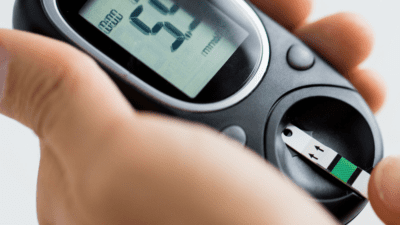
Diabetes and stress are closely connected. Stress can both contribute to and result from diabetes. For instance, managing meals and blood sugar levels can be stressful for someone newly diagnosed with diabetes. This stress can also elevate blood sugar and glycated hemoglobin levels. Studies have linked chronic stress to a higher risk of type 2 diabetes. Furthermore, recent research indicates that individuals with depression and anxiety face an increased risk of developing this type of diabetes.
Stress can indeed have a profound impact on various aspects of health, particularly concerning diabetes risk.
- Lifestyle Factors: Chronic stress can influence diabetes risk through several lifestyle pathways:
- Stress-related dietary changes may lead to higher intake of unhealthy foods, such as those high in sugars and fats, contributing to weight gain and insulin resistance.
- Reduced physical activity levels due to stress can impact glucose metabolism and overall metabolic health.
- Stress may also exacerbate substance use behaviors like smoking and excessive alcohol consumption, both of which are associated with an increased risk of diabetes.
- Hormonal Impact: Stress activates physiological systems such as the hypothalamic-pituitary-adrenal (HPA) axis and the sympathetic nervous system (SNS), leading to hormonal changes that affect glucose regulation:
- Elevated cortisol levels in response to stress can impair insulin sensitivity and promote gluconeogenesis, resulting in elevated blood sugar levels.
- Alterations in sex hormone levels, including decreased testosterone and disrupted estrogen levels, can further influence insulin action and metabolic processes.
- Body Composition Changes: Prolonged stress can contribute to changes in body composition, particularly an increase in visceral adiposity:
- Accumulation of visceral fat is associated with insulin resistance and a higher risk of developing type 2 diabetes.
- Changes in waist-to-hip ratio, indicative of central adiposity, are strongly linked to metabolic abnormalities and cardiovascular risk factors.
Assessing the Impact of Stress on Blood Glucose Levels
Individuals seeking to discern the influence of stress on their blood sugar levels can adopt a systematic approach involving regular blood glucose monitoring. This entails measuring blood glucose levels at intervals throughout the day while taking note of concurrent emotional states and the timing of recent meals.
By maintaining a record of these readings alongside associated emotional experiences, individuals can provide comprehensive data for analysis by healthcare professionals, particularly their primary care physician or diabetes specialist.
Upon reviewing the collected data, healthcare providers can assess potential correlations between stress episodes and fluctuations in blood glucose levels. If a correlation is evident, healthcare professionals may recommend tailored interventions and stress management techniques to help individuals effectively regulate their blood sugar levels amidst stress-induced variations.
Understanding these physiological mechanisms is essential for developing targeted interventions aimed at mitigating the impact of stress on diabetes risk and improving overall metabolic health.
Minimizing Stress Levels for Diabetes Management
The American Diabetes Association emphasizes the importance of addressing psychological well-being alongside physical health in individuals with diabetes. Stress plays a dual role as both a potential contributor to the onset of diabetes and a consequence of living with the condition. However, numerous effective strategies exist to alleviate stress, although their efficacy can vary among individuals.
By implementing stress management techniques, individuals may experience improvements in glycated hemoglobin levels, a pivotal marker used by healthcare professionals to gauge long-term blood sugar regulation and mitigate diabetes-related complications.
Moreover, individuals with diabetes and stress may observe enhanced glycemic control by adopting stress-reducing techniques that bolster coping self-efficacy and perceived social support. Some effective strategies include:
- Mindfulness-Based Stress Reduction (MBSR): Research has extensively explored the benefits of MBSR techniques among diabetes patients. A 2018 study revealed that participants who underwent mindfulness sessions alongside educational interventions exhibited notable enhancements in mental health parameters and diabetes management metrics, including fasting blood glucose and glycated hemoglobin levels.
- Anger Management: Individuals experiencing anger related to diabetes should endeavor to identify and address the underlying triggers. The American Diabetes Association suggests practical tips for managing angry feelings, such as deep breathing exercises, hydration, adopting a relaxed posture, engaging in physical activity like walking, and cultivating mental calmness.
By integrating these evidence-based stress management strategies into daily routines, individuals with diabetes can potentially enhance their overall well-being and optimize glycemic control, thereby reducing the risk of diabetes-related complications.
The American Psychological Association advocates for several evidence-based stress reduction techniques:
- Brief Respite: Taking short breaks from stressors, whether they involve significant work projects or financial concerns like mounting credit card bills, can provide valuable relief. This pause allows individuals to regain perspective and recharge mentally.
- Regular Exercise: Engaging in physical activity, such as a 20-minute walk, run, or swim, can significantly alleviate stress. Exercise releases endorphins, which are natural mood enhancers, and promote overall well-being.
- Smiling and Laughter: Actively smiling and seeking moments of laughter can help release tension from facial muscles and promote relaxation throughout the body. This simple yet effective technique contributes to stress reduction.
- Social Support: Seeking support from trusted friends or family members can offer emotional reassurance and practical advice, fostering a sense of connection and reducing feelings of isolation during stressful times.
- Mindfulness and Meditation: Practicing mindfulness or meditation techniques can cultivate awareness of the present moment, promote relaxation, and enhance resilience to stressors. These practices encourage a non-judgmental acceptance of thoughts and emotions, contributing to overall stress reduction and well-being.
By incorporating these scientifically-backed stress management strategies into daily routines, individuals can effectively mitigate the negative impacts of stress on physical and mental health.
References:
- Five tips to help manage stress. (n.d.). American Psychological Association.
- Pouwer, F., et al. (2010). “Does emotional stress cause type 2 diabetes mellitus? A review from the European Depression in Diabetes (EDID) research consortium.” Discovery Medicine.
- Understanding diabetes and mental health. American Diabetes Association.
- Kian, A. A., et al. (2018). “The impact of mindfulness-based stress reduction on emotional wellbeing and glycemic control of patients with type 2 diabetes mellitus.” Journal of Diabetes Research.





























